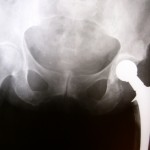Prevent hip fracture with these 4 tips. This is important information to share with your loved ones over holiday visits! Hip fractures are serious injuries that most often occur in people aged 65 and older. Women are especially vulnerable to hip fractures with approximately 70% of hip fractures occurring in females. Most hip fractures require surgery, hospitalization, and a considerable amount of rehabilitation. Read more on how to prevent hip fracture in this article by guest blogger Dr. Adam Rana of Maine Medical Partners.
Tips to prevent hip fracture include:
- Home Safety:Most hip fractures occur as a result of a fall, and most falls occur in the home. Many falls can be prevented by simple home safety improvements, such as removing clutter, providing enough lighting, and installing grab bars in bathrooms.
- Exercise: Moderate exercise can slow bone loss, maintain muscle strength and help prevent hip fracture. It can also improve balance and coordination. Good exercise options include aquatic exercises, hiking, swimming, dancing, and weight training. Make sure to talk to your doctor if you are just beginning an exercise program.
- Health and Medication Understanding: Make sure to have an annual eye examination. In addition, an evaluation for cardiac and blood pressure problems should be performed annually. Review with your doctor side effects of any medications and over-the-counter drugs.
- Consider bone-boosting medications: In addition to calcium and Vitamin D supplements, there are many drug options that slow bone loss and increase bone strength.
Prevent Hip Fracture and Save Independence
 Many people who previously lived independently before sustaining a hip fracture require assistance afterward. This can range from help from family members and home health professionals, to admittance to a nursing home or other long-term health facility.
Many people who previously lived independently before sustaining a hip fracture require assistance afterward. This can range from help from family members and home health professionals, to admittance to a nursing home or other long-term health facility.
At Maine Medical Center a multispecialty approach is taken to managing hip fracture patients. Specialists include Orthopedic Surgeons, who surgically fix or stabilize these fractures. MMC also has in-house Hospitalists. These are doctors who practice only in the hospital, and don’t have an outside office. Some of them focus on managing medical problems that are often found in people who suffer hip fractures, like heart or lung related issues.
The majority of hip fractures are due to factors that weaken bone, combined with the impact from a fall. As we age our bones strength decreases. Bones can become very weak and fragile, a condition called osteoporosis. Osteoporosis often develops in women after menopause, and in men in older age. This bone-thinning disorder puts people at greater risk for broken bones. Certain bones that are at higher risk for fracture include the hip, wrist, and spine.
Prevent Hip Fracture: Know your Risks
Factors that put you at greater risk for a hip fracture are those that cause bone loss. Seven risk factors include; age, gender, genetics, nutrition, lifestyle, physical impairments and medications.
- Age:The risk for hip fractures increases as we age. In 2010, more than 80% of the people hospitalized for hip fractures were age 65 and older.
- Gender: In 2010, 72% of hip fractures in people aged 65 and older occurred in women.
- Genetics / Heredity: A family history of osteoporosis or broken bones in later life puts you at greater risk for a hip fracture. People with small, thin builds are also at risk.
- Nutrition: Low body weight and poor nutrition, including a diet low in calcium and Vitamin D, can make you more prone to bone loss and hip fracture.
- Lifestyle: Smoking, excessive alcohol use, and lack of exercise can weaken bones. These factors also put you at greater risk for falling and can increase the possibility of sustaining a hip fracture.
- Physical and mental impairments: Physical frailty, arthritis, unsteady balance, poor eyesight, senility, dementia and/or Alzheimer’s disease can increase the likelihood of falling.
- Medications: Many medicines can affect balance and strength. Side effects of some medications can also include drowsiness and dizziness.
Review your risks, and take another look at the measures that help you prevent hip fracture. Maintaining a healthy weight, eating right, getting exercise are all within our power! While you can’t change your gender or your age, you can control other things in you life, and help prevent hip fracture.